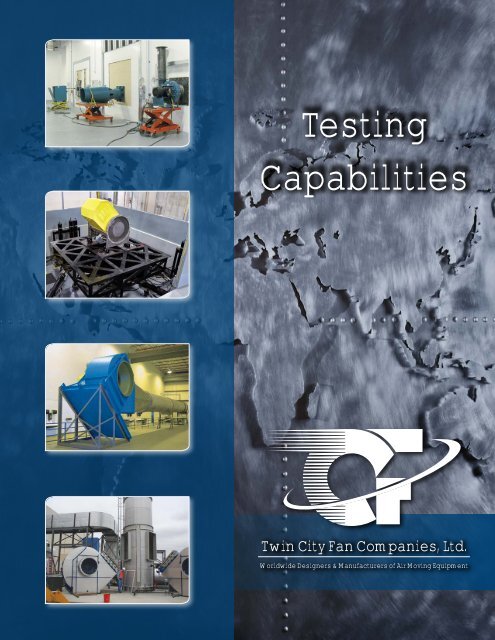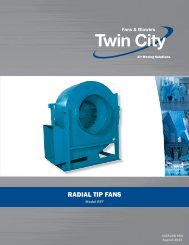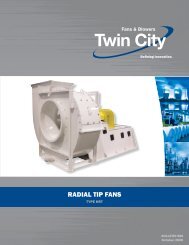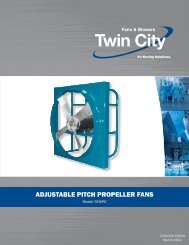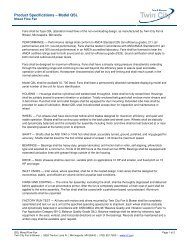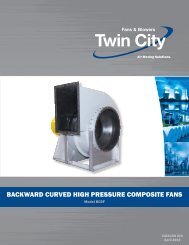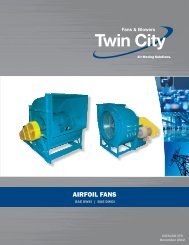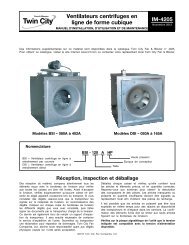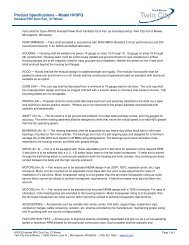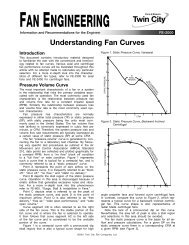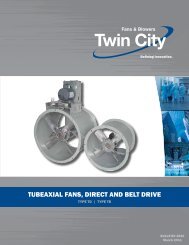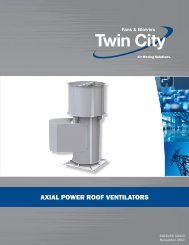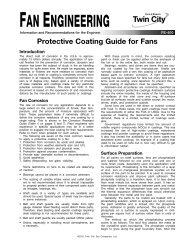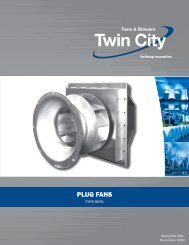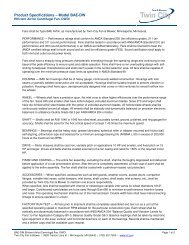Testing Capabilities - Twin City Fan & Blower
Testing Capabilities - Twin City Fan & Blower
Testing Capabilities - Twin City Fan & Blower
You also want an ePaper? Increase the reach of your titles
YUMPU automatically turns print PDFs into web optimized ePapers that Google loves.
<strong>Testing</strong><br />
<strong>Capabilities</strong><br />
<strong>Twin</strong> <strong>Twin</strong> <strong>City</strong> <strong>City</strong> <strong>Fan</strong> <strong>Fan</strong> Companies, Companies, Ltd. Ltd.<br />
Worldwide Designers & Manufacturers of Air Moving Equipment
<strong>Testing</strong><strong>Capabilities</strong><br />
<strong>Twin</strong> <strong>City</strong> <strong>Fan</strong> Companies, Ltd.<br />
®<br />
In today’s business world, adapting to the needs of<br />
customers is more important than ever. That is why<br />
<strong>Twin</strong> <strong>City</strong> <strong>Fan</strong> Companies (TCF) has made substantial<br />
investments to greatly enhance our comprehensive<br />
testing capabilities. These investments include a brand<br />
new state-of-the-art testing laboratory located at our<br />
worldwide headquarters in Minneapolis, MN;<br />
extended testing capabilities for proving performance<br />
on fans up to 4,000 HP at the manufacturing plant<br />
level; and purchasing cutting edge testing equipment<br />
and tools for enhancing our field testing capabilities.<br />
The scope of TCF’s testing capabilities are very broad<br />
and covers a wide spectrum of in-house and onsite<br />
testing services. With this level of technology, we can<br />
continue to provide our customers with proven<br />
solutions to their particular air movement needs while<br />
ensuring that they receive the highest quality product<br />
for their exact requirements and structural needs. This<br />
includes the evaluation of existing systems to optimize<br />
performance and reduce power consumption.<br />
With the most sophisticated research and development<br />
testing laboratories in the industry, only TCF has the<br />
collective experience and knowledge needed for tackling<br />
the most technically complex testing requirements for<br />
the most demanding environments.<br />
Laboratory Highlights<br />
10' x 10' shaker table capable of seismic testing up to<br />
10,000 lb fans to meet IBC and OSHPD requirements<br />
Max test fan HP up to 4,000<br />
Overspeed vacuum test chamber<br />
73,000 cubic foot reverberant sound room with pure<br />
tone qualification and environmental isolation<br />
Fabrication capacities for testing new concepts<br />
2 Worldwide Designers & Manufacturers of Air Moving Equipment
<strong>Twin</strong><strong>City</strong><strong>Fan</strong>Companies<br />
In-House <strong>Testing</strong> <strong>Capabilities</strong><br />
TCF<br />
R AMCA 204 Balance & Vibration <strong>Testing</strong><br />
R AMCA 210 Performance <strong>Testing</strong><br />
R AMCA 250 Jet <strong>Fan</strong> Thrust <strong>Testing</strong><br />
R AMCA 260 Induced Flow <strong>Testing</strong><br />
R AMCA 300 Sound <strong>Testing</strong><br />
TCF <strong>Testing</strong> Laboratory<br />
R UL 705 Safety <strong>Testing</strong><br />
R Seismic <strong>Testing</strong><br />
R High Temperature/Survivability <strong>Testing</strong><br />
R Mechanical Run <strong>Testing</strong><br />
R Narrow Band Sound & Vibration <strong>Testing</strong><br />
R Impact (Bump) & Overspeed <strong>Testing</strong><br />
R Strain Gage <strong>Testing</strong> & Analysis<br />
Lab Control Station<br />
R Modal Analysis <strong>Testing</strong><br />
R Vibration Analysis & FFT Spectrum Analysis<br />
R Scaled Model <strong>Testing</strong><br />
R Custom / OEM Product Designs<br />
On-Site <strong>Testing</strong> <strong>Capabilities</strong><br />
AMCA 300 Sound Test Facility<br />
R AMCA 203 & 803 Performance <strong>Testing</strong><br />
R Sound <strong>Testing</strong><br />
R Vibration Analysis & FFT Spectrum Analysis<br />
R Balance & Alignment <strong>Testing</strong><br />
R Modal Analysis <strong>Testing</strong> & Operation Deflection<br />
Shape (ODS) Analysis<br />
10'x10' Shaker Table for Seismic <strong>Testing</strong><br />
www.twincityfan.com 3
<strong>Testing</strong><strong>Capabilities</strong><br />
Air Performance <strong>Testing</strong><br />
Test Lab – AMCA 210 Chamber & AMCA 260 Induced Flow <strong>Testing</strong><br />
TCF can provide accurate and repeatable airflow, pressure and<br />
power data for fans of all types by performing an airflow<br />
measurement test per AMCA standards 210 and 260 using one<br />
of three chambers and our AMCA 260 induced flow box located<br />
in our test lab. Two of the chambers can accommodate airflow<br />
rates up to 65,000 cubic feet per minute and static pressures up<br />
to 10 inches of water while the third high pressure chamber can<br />
handle airflow rates up to 10,000 cubic feet per minute and static<br />
pressures up to 80 inches of water. The AMCA 260 box is capable<br />
of testing fans with inlet diameters of 50 inches or smaller.<br />
Manufacturing Plant - AMCA 210 Duct <strong>Testing</strong><br />
When a fan exceeds the size limitations of our chambers, large<br />
scale duct testing can be conducted at one of our manufacturing<br />
plants. TCF can provide accurate and repeatable results by<br />
performing airflow measurement testing per AMCA standard<br />
210 for fans of virtually any size, airflow rate, static pressure<br />
and horsepower. This method of testing is very space consuming<br />
and requires a very long duct section to be attached to the fan.<br />
Manufacturing Plant - Modified AMCA 203 Guidelines<br />
Another option for determining the airflow performance of<br />
fans that are too large for our chambers is to perform an airflow<br />
measurement test using guidelines from AMCA publication<br />
203 at one of our manufacturing plants. For this particular test,<br />
fans are installed with ductwork on the outlet and either a bell<br />
or duct on the inlet. This results in accurate and repeatable testing<br />
and generally requires less space than an AMCA 210 duct test.<br />
Note: TCF’s test lab, the Brookings, SD manufacturing plant and all testing<br />
personnel are NQA certified for the air performance testing of fans used in<br />
the nuclear power generation industry.<br />
Test Locations<br />
Test Lab Plant On-Site<br />
Field <strong>Testing</strong> - AMCA 203 & 803<br />
When installed fans are required to be tested in the field, they<br />
are tested in accordance with the AMCA 203 or 803 testing<br />
guidelines. AMCA 203 covers the field testing of all fans in<br />
general, whereas AMCA 803 covers the field testing of industrial<br />
process fans for the power generation industry. When testing<br />
any fan in the field, the overall system must be carefully taken<br />
into consideration to accurately determine where the measurements<br />
will be taken and if there are any system elements<br />
that may negatively affect the fan performance. This testing can<br />
lead to huge returns by optimizing existing systems.<br />
4 Worldwide Designers & Manufacturers of Air Moving Equipment
<strong>Twin</strong><strong>City</strong><strong>Fan</strong>Companies<br />
Sound Performance <strong>Testing</strong><br />
TCF has added a 73,000 ft 3 , reverberant sound room to its<br />
test lab for the purpose of conducting sound performance<br />
tests per AMCA standard 300. This room is qualified for both<br />
broadband and pure tone sound measurement and used for<br />
developing fan sound level ratings, troubleshooting noise<br />
issues and performing contract testing.<br />
For fans that are not able to be tested in our lab, TCF offers a<br />
modified AMCA 300 test guideline that can be performed at<br />
any of our manufacturing plants. This testing method utilizes<br />
principles from the standard that can be used outside of a<br />
reverberant sound room.<br />
If the fan must be tested in the field, TCF can perform an<br />
on-site sound survey. Principles from AMCA 300 can be<br />
applied, but special considerations must be made to account<br />
for background noise, motor and drive noise and room<br />
geometry and construction.<br />
Note: TCF’s test lab, the Brookings, SD manufacturing plant and all testing<br />
personnel are NQA certified for the sound performance testing of fans<br />
used in the nuclear power generation industry.<br />
Test Locations<br />
Test Lab Plant On-Site<br />
Standard balance tests are performed on all complete fan<br />
assemblies – size permitting. This ensures that there are no<br />
noticeable mechanical defects such as rubbing, bearing noise<br />
or excessive bearing heat and the vibration levels filtered into<br />
the running speed are reported. TCF can also provide<br />
vibration reports that include the filtered and overall levels if<br />
requested. Customers often require longer run tests to allow<br />
the bearing temperatures to stabilize. In order to achieve the<br />
stabilized temperatures, TCF will run the fan for two hours<br />
and record both the bearing temperatures and bearing<br />
vibration levels every 15 minutes – or as specified.<br />
When specifications call for the detrimental resonant<br />
frequencies in a fan assembly to be identified, TCF can perform<br />
a coast down test. Coast down testing involves running the<br />
fan up to the desired speed and then decelerating slowly. By<br />
recording the vibration levels until the fan comes to a stop,<br />
the detrimental resonant frequencies can be identified. In<br />
addition to these standard tests, TCF is able to test to any<br />
vibration specification that a customer requires.<br />
Vibration <strong>Testing</strong><br />
Test Locations<br />
Test Lab Plant On-Site<br />
www.twincityfan.com 5
<strong>Testing</strong><strong>Capabilities</strong><br />
Seismic <strong>Testing</strong><br />
Test Locations<br />
For geographical locations susceptible to earthquakes,<br />
it is critical to have equipment that is capable of<br />
operating after a seismic event. The California<br />
Office of Statewide Health Planning & Development<br />
(OSHPD) has established a program that requires<br />
all equipment used in any health care facility to be<br />
pre-approved prior to installation within the state of<br />
California. The International Building Code (IBC)<br />
has also developed stringent building codes for<br />
machinery that will be used in seismically active<br />
areas. As a result, TCF has invested in a shake table<br />
to simulate earthquakes that meet both IBC and<br />
OSHPD requirements. The table is 10' x 10' and is<br />
able to shake both floor mounted and ceiling hung<br />
units. The maximum payload weight is 10,000 lbs.<br />
Test Lab<br />
Bump <strong>Testing</strong><br />
If it is required to determine the natural frequencies<br />
of a fan rotor assembly and/or fan structure, TCF<br />
offers bump testing to identify these frequencies.<br />
Bump testing can be performed on a rotor assembly<br />
suspended in air or on a structure mounted to the<br />
floor and involves placing accelerometers in strategic<br />
locations on the rotor assembly and/or fan structure.<br />
Once the accelerometers are affixed to the unit, it is<br />
impacted with a mallet and the response is measured<br />
using diagnostic equipment to determine the natural<br />
frequencies present in the unit.<br />
Test Locations<br />
Note: All custom Clarage impellers are bump tested.<br />
Test Lab Plant On-Site<br />
6 Worldwide Designers & Manufacturers of Air Moving Equipment
<strong>Twin</strong><strong>City</strong><strong>Fan</strong>Companies<br />
Operational Modal <strong>Testing</strong><br />
When troubleshooting fan vibration issues, it is<br />
helpful to know the dominant mode shapes that are<br />
being excited. A useful tool for doing this is Operation<br />
Deflection Shape (ODS) testing. In this method,<br />
vibration readings are taken off the fan using<br />
accelerometers while it is running. These levels<br />
can then be imported into a 3-D model of the fan.<br />
By plugging in the actual vibration levels from the<br />
fan, it is possible to animate the vibration and see<br />
the mode shape that is being excited. This information<br />
is effective in determining if the vibration will cause<br />
early failures and reduce the life of the fan assembly.<br />
Test Locations<br />
Test Lab Plant On-Site<br />
Jet <strong>Fan</strong> Thrust <strong>Testing</strong><br />
When using jet fans in tunnel ventilation applications,<br />
it is critical to ensure that they are capable of quickly<br />
ventilating a tunnel in an emergency situation. These<br />
fans are specified by the amount of thrust they produce<br />
rather than a typical flow vs. pressure specification.<br />
TCF is able to test to AMCA standard 250 and ISO<br />
standard 13350, which outline the method for testing<br />
jet tunnel fans.<br />
In these tests, the fan is mounted on a table that is<br />
free to move axially on linear bearings. A stationary<br />
mounted thrust gauge is then attached to the table<br />
to measure the thrust generated by the fan while it<br />
is running. TCF has the capability to perform jet fan<br />
thrust testing both at our test lab and our manufacturing<br />
plant in Pulaski, TN.<br />
Test Locations<br />
Test Lab<br />
Plant<br />
www.twincityfan.com 7
<strong>Testing</strong><strong>Capabilities</strong><br />
Overspeed <strong>Testing</strong><br />
To ensure our customers that a fan will safely operate<br />
at the speed that they have specified, TCF has invested<br />
in overspeed chambers for our test lab and manufacturing<br />
plants. Overspeed testing allows us to run a fan<br />
at an increased speed for a given amount of time and<br />
prove that it will withstand the customer’s specific<br />
application.<br />
Test Locations<br />
The overspeed chamber in our test lab is capable of<br />
handling fan wheels up to 58 inches diameter. For<br />
large wheel sizes, the overspeed chamber at our<br />
manufacturing plants can accommodate wheel<br />
diameters up to 118 inches.<br />
Test Lab<br />
Plant<br />
High Temperature <strong>Testing</strong><br />
Certain applications require the fans to either be<br />
submerged in high temperature air or handle high<br />
temperature air in the airstream. That is why TCF<br />
has developed a method of testing the survivability<br />
of fans up to 900°F (482°C) at our Pulaski, TN<br />
manufacturing plant.<br />
Test Locations<br />
The test fan is installed in a closed loop system that<br />
recirculates the heated air through the fan. This ensures<br />
that the mechanical design of the fan is able to stand<br />
up to the hot environment. TCF’s customers can be<br />
certain that when the fan is installed in a high<br />
temperature application, it is ready to do the job.<br />
Plant<br />
8 Worldwide Designers & Manufacturers of Air Moving Equipment
<strong>Twin</strong><strong>City</strong><strong>Fan</strong>Companies<br />
Strain Gauge <strong>Testing</strong><br />
In many high speed applications, customers require<br />
strain gauge testing to ensure their fan can tolerate<br />
the application in which it is being used. This test<br />
involves utilizing a series of strain gauges that are<br />
applied in the largest stress concentration areas. By<br />
running the fan and measuring the strain, we can<br />
determine if there is any deformation in a fan wheel<br />
during operation.<br />
Strain gauge testing is a specialized procedure that<br />
requires careful attention to detail by a skilled and<br />
experienced technician. TCF is able to perform strain<br />
gauge testing at both our test lab and our manufacturing<br />
plant in Pulaski, TN.<br />
Test Locations<br />
Test Lab<br />
Plant<br />
UL 705 Safety <strong>Testing</strong><br />
For many commercial applications, UL 705 certification<br />
is required to ensure that the motor in a power roof<br />
ventilator will withstand voltage fluctuations, overheating<br />
and a variety of other abnormal circumstances.<br />
Our test lab has been accredited by UL to perform<br />
these tests on power roof ventilators up to 15 HP<br />
using a 60 Hz power source at any voltage between<br />
85V and 635V.<br />
The safety testing includes motor winding temperature<br />
rise tests at multiple voltages, start/stop testing, halfwave<br />
endurance testing (for motors supplied with<br />
solid state speed controllers), dielectric testing and<br />
rain testing.<br />
Test Locations<br />
Test Lab<br />
www.twincityfan.com 9
<strong>Testing</strong><strong>Capabilities</strong><br />
Custom / OEM Designs<br />
TCF has been custom designing products for our<br />
entire customer base for decades. By leveraging our<br />
expansive engineering and application expertise, we<br />
have become experts at tackling the most technically<br />
complex and unique applications. This often involves<br />
evaluating our customers’ existing fan technology<br />
and, in many cases, requires us to redesign and prototype<br />
a fully-customized fan solution.<br />
We have worked side-by-side with the most prevalent<br />
companies in the world and have earned a reputation<br />
for turning ideas into innovative solutions. Our<br />
individualized efforts to satisfy the specific needs of<br />
our customers is yet another way that we continue<br />
to distinguish ourselves in the market.<br />
<strong>Twin</strong> <strong>City</strong> <strong>Fan</strong> Companies, Ltd.<br />
TCF<br />
In-House<br />
Custom / OEM Designs<br />
R Prototyping<br />
R Product Redesign<br />
R Evaluation of Existing Products<br />
Engineering Services<br />
TCF products are engineered and optimized through<br />
a series of analyses and validation including Finite<br />
Element Analysis (FEA) and Non-Destructive <strong>Testing</strong><br />
(NDT). These tools are used to verify the structural<br />
integrity of our products under various loading<br />
conditions, analyze the natural frequencies, as well<br />
as analyze torsional natural frequencies. To better<br />
serve our customers, we can offer these services upon<br />
request.<br />
TCF<br />
In-House<br />
Engineering Services<br />
R Finite Element Analysis (FEA)<br />
R Non-Destructive <strong>Testing</strong> (NDT)<br />
R Computational Fluid Dynamics (CFD)<br />
R System Model Evaluation<br />
10 Worldwide Designers & Manufacturers of Air Moving Equipment
<strong>Twin</strong><strong>City</strong><strong>Fan</strong>Companies<br />
Having the peace of mind that your fan is installed and<br />
operating properly prior to startup is crucial. TCF can<br />
offer a wide range of startup services and precision<br />
checks including inlet and wheel operational<br />
clearances, torque verification, shaft alignment,<br />
balance and vibration testing. As part of our standard<br />
startup services, TCF field personnel will conduct a<br />
variety of inspection checks to ensure the fan is ready<br />
for startup – all the way from the foundation bolts to<br />
the lubrication of the fan.<br />
Startup Services<br />
We also offer Air Make-Up startup services. Our<br />
trained technicians can commission your natural gas<br />
fired heating equipment and control system.<br />
On-Site<br />
Startup Services<br />
R <strong>Fan</strong> Assembly Inspection<br />
R Vibration Checks<br />
R Coupling & Sheave Laser Alignment<br />
R Installation Assistance<br />
Keeping existing fans in service as systems change to<br />
suit environmental regulations, process enhancements,<br />
and energy consumption is an extremely important<br />
aspect of our business. We are proficient at applying<br />
our engineering experience to make the necessary<br />
modifications to existing equipment and can provide<br />
complete turnkey solutions for rebuilding and<br />
repairing fans in the field.<br />
Turnkey Services<br />
TCF also has a retrofit program designed to increase<br />
the efficiency of large industrial fans that can have<br />
paybacks in as little as six months.<br />
On-Site<br />
Turnkey Services<br />
R Installation & Commissioning<br />
R Field Repairs/Rebuilds<br />
R Duct Work Modification<br />
R Motor/Turbine Alignment<br />
R Coupling Alignment<br />
R Preventive Maintenance<br />
R Engineered Retrofits – All Brands<br />
R <strong>Fan</strong> Balancing<br />
www.twincityfan.com 11
Our Mission:<br />
To be a quality and highly respected global company in<br />
all that we do.<br />
To design, manufacture and distribute quality air moving<br />
and related equipment for worldwide use that fulfills<br />
the wants and needs of the customer at the best value.<br />
To provide our customers with a consistently high level<br />
of service:<br />
- before the order is secured<br />
- during its fulfillment<br />
- after the product has been delivered<br />
To create a partnership with our suppliers, customers,<br />
representatives and employees to enable us to continually<br />
improve our performance.<br />
To enhance and sustain our “company culture” to ensure<br />
it continues to thrive and allows us to develop longstanding<br />
relationships that contribute to our success.<br />
<strong>Twin</strong> <strong>City</strong> <strong>Fan</strong> Companies, Ltd.<br />
<strong>Twin</strong> <strong>City</strong> <strong>Fan</strong> Companies, Ltd. | 5959 Trenton Lane N | Minneapolis, MN 55442<br />
Phone 763.551.7600 | Fax 763.551.7601 | www.twincityfan.com


